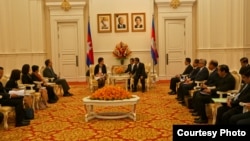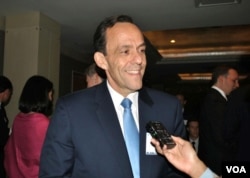US business representatives and observers say Cambodia’s recent political settlement has boosted confidence in the country’s reform agenda and increasingly favorable investment climate.
Daniel Henderson, an analyst of the Washington-based US-Asean Business Council, was part of a trade mission of US businesses to Cambodia in September. He says the current investment climate is promising.
He says the current investment climate is promising. “I think certainly all investors are encouraged to see an agreement between both sides and stability within the country and are hopeful that these will be very positive for the investment climate,” he said in an interview with VOA Khmer.
The July 22 agreement ended a yearlong post-election political deadlock that saw an opposition boycott of parliament, large demonstrations by opposition supporters and striking garment workers, as well as fatal government crackdowns in January. These events have raised concerns among investors.
The US-Asean Business Council trip follows other trade missions that occurred around the time of Cambodia’s post-election political settlement.
Cambodian Commerce Minister Sun Chanthol and US Ambassador William Todd co-led a trade mission in the US in June to woo US investors. During the trip, the Cambodian minister promised serious reforms to address long-standing structural problems for investors.
Henderson said those trips have raised Cambodia’s profile to US investors, who see opportunities in the country’s young population, growing middle class and upcoming integration into the larger Asean market.
Ambassador Todd agrees with the significance of the political settlement, saying US businesses already have an eye on Cambodia, but the end to the political deadlock will allow even more companies that have been “waiting by the sidelines” to invest.
The ambassador told VOA Khmer at a gathering of US businesses in Washington in early October that the greater willingness to reform and the prospect of greater stability make this a good time for companies.
“We believe that with political settlement, with the possibility of reform, that it’s the right place at the right time you can make a difference for business,” he said. “And we think that there is opportunity in Cambodia that would benefit Cambodia and benefit America.”
Mao Savin, investment manager at Emerging Markets Investment, says political stability in Cambodia matters to foreign investors more than it does in neighboring countries like Thailand, which has a stronger administrative civilian system to minimize the effects of political uncertainty. He said companies that are already eyeing the country can expedite their launch.
One of those companies, the US real estate giant Century 21, opened an office in Cambodia in September, less than two months after the political deal.
But while political stability gives Cambodia a short-term outlook boost, its long-term attractiveness to US investors will depend on long-promised reforms, particularly in education, energy security and anti-corruption. These, analysts say, have prevented US companies from investing in other growing sectors.
Although the US is Cambodia’s largest trading partner, US investment in Cambodia remains relatively low, compared to other countries like China and South Korea, and largely confined to the garment sector.
But this could change. The government’s reform efforts began before the political deal, but Mao Savin said from a foreign investor’s point of view the deal gives greater legitimacy and prospect of success to the effort.
“Before [the two parties] reached a settlement, the government was already implementing reforms,” he said. “But without participation from both sides, I think those reforms would be either slow or less effective.”
Henderson said some immediate reforms he observed on his recent Cambodia trip include a new and more capable Cabinet and reform measures by Sun Chanthol that have improved the “ease of doing business in Cambodia.”
That includes “the customs process, more automation of registering businesses and everything involved in starting up a company,” he said. “The next step, which obviously we would be looking to work with, is to find more investment opportunities to draw in ever bigger US companies.”
Despite these positives, Henderson and Mao Savin say attracting larger companies in emerging sectors like infrastructure, ITC, finance and agriculture remains a challenge due to land rights violations, corruption and a low-skilled workforce.
Cambodia’s education system remains weak compared to other Asean countries. The two analysts agree that educational reform will take time but that it will be key for Cambodia’s competitiveness and attractiveness for US investors. Nevertheless, they are encouraged by the government’s efforts to reduce cheating on high school exams and to increase vocational training.
Cambodia’s investment outlook will likely also be boosted by a World Bank forecast earlier this month that said the country’s economy will grow at a robust 7.2 percent this year within a strong Asia overall and despite gloomy forecast elsewhere. US direct investment in Cambodia totaled $54 million in 2012, up 45.9 percent from the previous year, according to data from the Office of US Trade Representative.
There are also signs that larger US companies are paying attention, beyond the garment sector. Mao Savin said the recent investment by Century 21 in the country’s real estate sector could potentially be significant.
“I think the presence of Century 21 could change the attitude or views of some US investors,” he said.
It remains to be seen whether Cambodia will be able to deliver its reform promises to continue to attract these larger US investment. But for now analysts say Cambodia currently has the best chance to do so.












